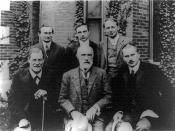Humans need interaction with one another; however, whether a person joins a group is largely dependant on number of variables such as 'personal traits, social motives and gender' (Forsyth, 1999, p. 116). There are distinct traits and qualities in individuals who seek out membership in groups and those who avoid it.
My sister and I are like chalk and cheese; our personalities are at either ends of the continuum. While my sister is quiet, soft spoken and thrives on her time alone, myself on the other hand love the company of others and I feel energised when I am surrounded by groups of people. Over the years, I have engaged in number of 'groups' such as youth groups, orchestra, art groups, volleyball and basketball teams and I have a wide network of acquaintances and friends, whereas in contrast my sister keeps to herself and joins groups only when she is forced to.
My sister prefers to do things on her own and comes across as withdrawn and shy.
Psychologist Carl G. Jung (1924) would describe the personalities of my sister and myself as 'introversion- extraversion.' While my sister is described as an introvert holding 'bashful, withdrawn, quiet, reclusive, and shy,' qualities (Forsyth, 1999, p. 91) keeping a limited contact with people, myself conversely, feeds off the energy groups provide to fulfil my outgoing, sociable and extrovert nature. It is understood that extraverts, more so than introverts are likely to engage in group- like situations and environments because extraverts find group interaction interesting and 'stimulating' (Eysenck, as cited in Forsyth, 1999, p. 91) therefore in conclusion, extraverts are more likely to join group than of someone with introvert tendencies.
Other personal qualities may also push an individual towards or away from joining groups. An individual holding high levels of social anxiety...


